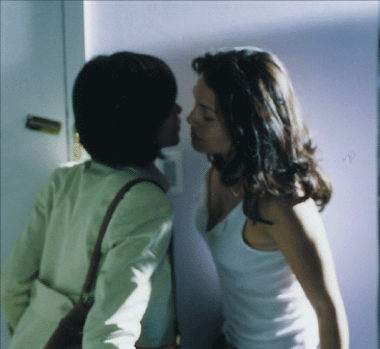Asian-American comedy aims squarely for the center
Writer/director Georgia Lee describes the Wong family—around whom her film “Red Doors” revolves—as dysfunctional. She’s being unkind to her characters, who are actually quite wholesome. Sure, her patriarch vanishes halfway through the film, but the rest of the family gets along okay without him.
Lee avoids a Todd Solondz/Alan Ball-inspired depiction of suburbia as a hellhole of sexual and substance abuse. In some ways, the “Red Doors” version of family values—gay-inclusive and optimistically feminist—recalls the current Indiewood hit “Little Miss Sunshine,” which is basically a would-be hip remake of “National Lampoon’s Vacation.”
Lee’s film seems born both out of a love for pop culture and a frustration with the way it usually renders Asian-Americans invisible. At heart, it’s a blown-up sitcom. Warner Brothers has acquired it for DVD release; were the Wongs Caucasian, I’m sure a studio—or at least its “indie” division—would be putting it out theatrically as well.
The Wongs live in suburban New York, a short train ride away from the city. Ed (Tzi Ma) has just retired and spends a lot of time looking at home videos on his computer. The film concentrates on his three daughters. Samantha (Jacqueline Kim), the eldest one, is a businesswoman who plans to marry her fiancé Mark (Jayce Bartok) soon.
Julie (Elaine Kao) is a medical student who works at a hospital. She meets movie star Mia (Mia Riverton), who’s researching a role, and falls in love. High school senior Katie (Kathy Shao-Lin Lee) is the family rebel, getting into a series of practical jokes with her neighbor Simon (Sebastian Stan). The mother, May-Li (Freda Foh Shen), is the only member of the family who seems relatively untroubled.
“Red Doors” attempts both humor and pathos. The former comes early, for the most part, and gradually blends into the latter. While never as poignant as it would like to be, the film’s better at drama than comedy. Its sense of humor allows it to skirt serious situations superficially. Ed tells a psychiatrist that he’s attempted suicide 30 or 40 times, but the film plays his two onscreen attempts for laughs. Many of the gags seem designed for inclusion in a trailer—they might actually be funnier out-of-context.
More often than not, the characters’ behavior feels contrived. When Ed departs for a Buddhist monastery, we have to take it on faith that he’s had a spiritual awakening—or, at least, that the religion’s skepticism about earthly satisfaction strikes a chord with his depressed state of mind. When Ed and Katie send instant messages to each other even though they’re in the same house, “Red Doors” reveals a potential missing from the remainder of the film. With his addiction to video footage, Ed could be a character in
Atom Egoyan’s “Speaking Parts” or “Family Viewing.”
On the other hand, Katie doesn’t really have much to do except be zany. “Red Doors” hints at her sexual awakening—at school, she’s caught with bondage porn, and she brings home a large selection of sex toys—but never really explores it. When she interrupts her father in the bath with a dildo hanging out of her pocket, it’s a funny moment, but her desires remain little more than a sight gag. Her pranks, which include setting off bombs in other students’ lockers, flirt with danger but never result in arrest or serious injury.
Rather than making a “gay film,” Lee integrates lesbian characters into a larger family. While “Red Doors” winds up being something of a coming-out film, Julie shows little angst over her sexuality. The fact that Mia is a celebrity—who, in an interview, refers to her lovers as “pets”—causes far more trouble. Unfortunately, the scene where Julie and Mia finally reveal their relationship to her mother rings false. Would even the most homophobic or sheltered parent faint at seeing her daughter kiss another woman?
In a healthier culture, Lee would be making romantic comedies in which Sandra Oh and Jennifer Aniston fall in love, rather than low-budget films. Given the media’s racism and sexism, her desire to put a distinctly Asian-American and female stamp on a sensibility derived almost entirely from mainstream comedy is commendable, but it doesn’t translate to interesting work. Inadvertently, “Red Doors” does its part to fight racism by suggesting that Asian-Americans’ stories can be as bland and pat as anyone else’s.
gaycitynews.com


































